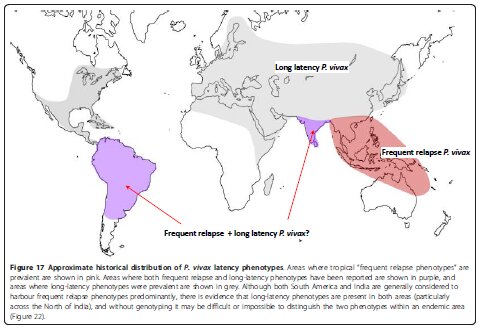P. vivax malaria relapse
What are relapses?
Reactivation of P. vivax hypnozoites from the dormant stage of the parasite causes clinical relapses. Hypnozoites are carried silently, with no symptoms, and humans can transport the parasite to new areas or areas where malaria transmission has been interrupted.1 Addressing P. vivax malaria in different regions will likely require intervention strategies specifically targeted at the pattern of relapse. Thus, understanding relapse patterns is directly relevant to the design of P. vivax malaria control and elimination strategies.
How frequent are relapses?
Hypnozoites causing relapses may be reactivated in as short as two weeks or as long as 10 months after initial infection.1 Incidence and temporal patterns of relapse vary geographically. In some regions, P. vivax malaria relapses can be more prevalent than primary infections caused by mosquito-to-human transmission. This scenario can also occur seasonally.1
Long latency
- Temperate and sub-tropical strains have a long latency period between the primary infection and relapse, typically 8–10 months.1
- Long-latency relapses appear to be an adaptation that allows the parasite to shelter in the human host when vector populations may be scarce.1
Short latency
- Tropical strains have short incubation times and short relapse intervals.1
- Short-latency relapses with repeated gametocyte generation increase the probability of human-to-mosquito transmission.1
- In contrast to the long-latency relapses for P. vivax malaria, relapses with short-latency infections (Chesson strain) occurr earlier and at higher rates, with relapse rates as high as 90% within 6 weeks of the treated primary infection.1
What triggers relapse?
The specific triggers for hypnozoite reactivation remain unknown and it is likely that relapse latency and triggers in different parasite populations are adapted to the particular environmental conditions and host biology/ecology.2
- In some P. vivax populations relapses occur at a very predictable rate; and in these cases hypnozoites may be constantly reactivating and ‘leaking’ from the liver, only causing symptoms if the immunological response is inadequate.2
- The occurrence of a new malaria infection or a febrile illness may also trigger hypnozoite reactivation.2 For example, P. vivax malaria relapse can occur after P. falciparum malaria. This would make sense biologically, as inoculation with a new parasite strain by a mosquito indicates that conditions are favourable for transmission.
For P. vivax malaria there is no method for distinguishing between a recrudescence (recurrence of the initial infection due to inadequate anti-malarial treatment resulting in parasites not being completely cleared during the treatment), relapse (hypnozoite reactivation) or re-infection (new infection transmitted by a mosquito). For more information on this, download the fact sheet.
